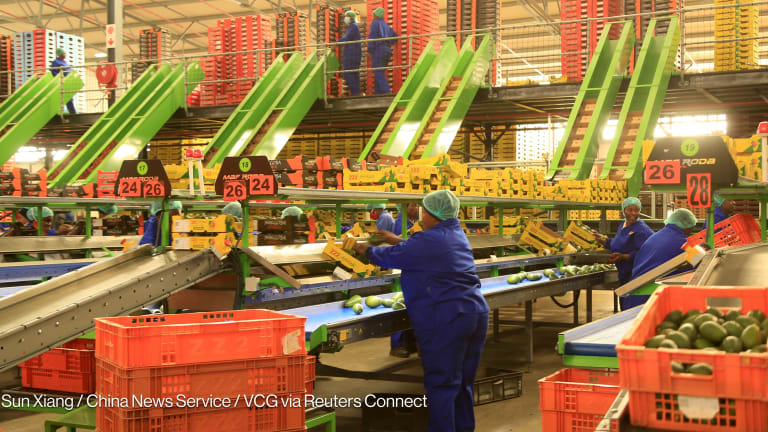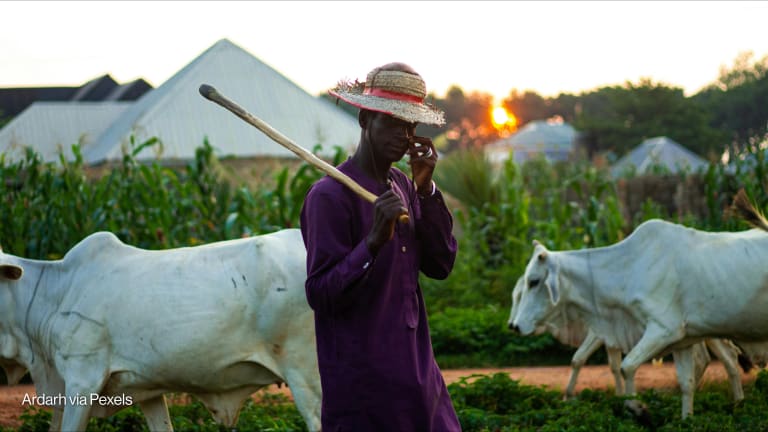
The footprint of farming has been growing across Africa, bringing the continent to a crossroads. The first road leads us towards conflict between people and the planet; while the second puts us on the path to enriching Africa without impoverishing nature. This path needs us to reset our relationship with nature and to rethink, refresh, and reimagine agriculture in Africa. The continent is where crops and conservation meet, where farmers herding cattle walk on the same trails used by lions, gazelles, rhinos, and elephants.
Nature and food are both central to Africa’s future. Natural capital provides up to 50% of total wealth in most African countries and up to 70% of the African population is dependent on nature for their livelihoods. Unsustainable agricultural practices are already the biggest threat to Africa’s natural capital, but there is a clear need to increase food availability as 2 out of 3 of the world’s acutely food insecure population is in Africa.
Encouragingly, Africa is estimated to be home to 60% of the world’s remaining arable land, but expanding into it creates many additional threats to nature. As global and regional populations grow, this land will be at the forefront of the tension between balancing short-term food production and long-term investment in natural capital.
Sustainably feeding a growing population is not just about producing more food, it is about producing it differently and better.
A new vision for Africa’s food systems
Read WWF's Reimagining Africa's Food Future paper, which explores how unsustainable agricultural practices to meet growing demand for food are threatening ecosystem integrity and resilience.
Reimagining Africa’s food future
At the World Wide Fund for Nature, or WWF, we are calling for a reimagining of Africa’s food future. Instead of conflict between agriculture and conservation, we need a food system that has people and nature at its center.
Healthy and nutritious diets for all is one of the most pressing challenges Africa faces. Currently, Africa is a net food importer, bringing in $10-15 billion worth of agricultural products more than those exported. But every $1 billion spent on food imports is “equivalent to the annual income of 334,000 farming households, representing 670,000 on-farm jobs and 200,000 off-farm jobs.” The increasing reliance on food imports is contributing to rural poverty, unemployment, and food insecurity, with 1 in 5 people remaining hungry in Africa.
But simply expanding or intensifying production is not the answer to addressing Africa’s food insecurity. Already, more than one-third of Africa’s land is used for agriculture. Intensifying activity on this land, by increasing chemical inputs to increase yields, will degrade soils and, in the long-term, reduce productivity, necessitating expansion.
Africa is estimated to be home to 60% of the world’s remaining arable land, but expanding into it creates many additional threats to nature.
—Bringing new land into agricultural production, whether in response to degradation or a desire to increase area under production, also has its challenges. Agricultural expansion often occurs in land less suited to farming and more vulnerable to degradation, quickly threatening productivity gains.
Similarly, expansion frequently leads to the loss of critical habitat, fragmenting ecosystems, disrupting the movement of wildlife, and threatening valuable ecosystem services such as carbon sequestration, pollinators, and water retention — undermining the long-term productivity of agriculture in the area and exacerbating human-wildlife conflict.
Landscape-based approaches, including a shift away from maximizing production at the expense of nature to farming with biodiversity to achieve nature-positive production at scale, are the only way to successfully increase agricultural production while preserving nature and mitigating climate change.
Part of our The Future of Food Systems series
Find out how we can make food fair and healthy for all. Join the conversation using the hashtag #FoodSystems and visit our The Future of Food Systems page for more coverage.
Landscape approaches, which provide a framework for integrating diverse land-uses across large spatial scales, are particularly important in Africa’s biodiversity-rich agricultural landscapes where the paths of people and wildlife, nature, and agriculture are intimately intertwined.
A systems approach, such as that in the Kavango-Zambezi, or KAZA, a transfrontier conservation area comprising an area roughly the size of France, enables planners and decision-makers to look beyond the immediate context of the field or grazing area to balance the needs of agriculture, infrastructure, settlements, and nature.
The Kavango-Zambezi Transfrontier Conservation Area
Learn how WWF is promoting agroecological practices to reduce nature conversion and increase food and nutrition security of local communities in the KAZA landscape, renowned for its wildlife-based tourism and supported by huge wildlife migrations.
It also facilitates investments in critical components of a sustainable food system, including safe drinking water, good sanitation, education, gender equality, and access to finance for small-scale farmers. In brief, landscape approaches support policies and practices that are good for both human and environmental health.
A shared responsibility to ensure a flourishing Africa
The upcoming United Nations Food Systems Summit, and other U.N. COPs on climate, biodiversity, and land, provide key opportunities to elevate the profile of such integrated thinking. The world will benefit from these approaches so a shared responsibility must be assumed. It is necessary for African member states to prioritize landscape-based approaches and the scaling out of agroecological approaches and regenerative agriculture.
There must be agreements to work across borders in key landscapes. Non-African member states and businesses must also invest in systems approaches in the region, focusing not just on yield but the improvement of all ecosystem services. As investment into Africa’s agricultural sector increases there must be safeguards to avoid ecological impacts.
We all strive for a future with healthy people and a healthy planet. In Africa, this specifically means people with access to nutritious food, economic growth, and development opportunities living in harmony with wildlife and the incredible natural habitats that span our continent.
Achieving these goals will take collective action, but as the world implements a green recovery from the pandemic, we are presented with unique opportunities to ensure that at the end of the Decade of Action, Africa is flourishing. We must not waste them.
Now is the time to reset Africa’s relationship with nature to feed the continent and conserve nature. We must rethink, refresh, and reimagine agriculture in Africa today for a better tomorrow.
Visit the Future of Food Systems series for more coverage on food and nutrition — and importantly, how we can make food fair and healthy for all. You can join the conversation using the hashtag #FoodSystems.










